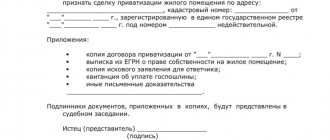Privatization of real estate is the process of alienation for a fee of material assets belonging to the Russian Federation, regions and administrative-territorial entities. The acquirers of rights in this case can be legal entities or citizens. During this process, municipal or state property is transformed into private property. Let's consider the features of this procedure.
Exceptions
The list of privatization objects regulated by Federal Law No. 2001 does not include:
- Earth. The exception is areas on which immovable objects are located, including property complexes.
- Natural resources.
- Property transferred for economic management/operational management to municipal and state institutions, municipal unitary enterprises and state unitary enterprises.
- Housing stock.
- Municipal and state property transferred to the ownership of non-profit structures created in the process of transforming a municipal unitary enterprise or state unitary enterprise.
- State Reserve
- Municipal and state property located outside the Russian Federation.
- Buildings, structures with plots, transferred free of charge to private ownership of religious organizations and all-Russian public associations.
- Municipal and state property in cases specified by international agreements.
- Shares in cases where the Ministry of Defense, the Russian Federation or subjects have the right to demand that the JSC repurchase them.
- Municipal and state property alienated on the basis of a court decision.
- Shares of an OJSC, securities convertible into them, when redeemed according to the rules established by law.
As mentioned above, any legal entity and citizens can participate in relations regarding the alienation of property. The exceptions are: municipal unitary enterprises, state unitary enterprises, municipal and state institutions, organizations, the share of the Russian Federation in the authorized capital of which is more than 25%, except in cases where the objects are made as a contribution to the assets of the JSC.
The difference between state and municipal property
State property differs significantly from municipal property both in subject and object composition, as well as in the grounds for its acquisition.
If the property is owned by federal authorities, then they are its managers, for example, the Ministry of Defense in relation to the housing stock under its jurisdiction. And if the property belongs to the municipality, then, accordingly, it is responsible for the future fate of the entrusted property, for example, it enters into social rent agreements with individuals on its own behalf or gives permission for privatization.
Example. A citizen has at his disposal several hectares of land on which he decided to grow agricultural products, and at the same time engage in hunting and fishing. How can I do that?
Suppose the territory is under the jurisdiction of a municipality. In this case, you can initiate privatization on the basis of a title document, for example, a lease agreement for a plot, or leave everything as is and implement your plans on the leased plot. Moreover, according to the current legislation, it is impossible to register ownership of a river, forest or environmental area.
Normative base
Subjects and objects of privatization, basic requirements for them, rules for carrying out the procedure, powers of the competent authorities are established by Federal Law No. 2001, as well as other laws and regulations adopted in accordance with it. At the same time, the provisions of other legal documents should not contradict federal regulations. Regional legislation includes legal acts adopted in accordance with Federal Law No. 2001. The list of objects subject to privatization within a particular municipality is compiled by territorial government structures independently, taking into account the legal provisions regulating this area.
Government Objectives
To implement a unified state policy in the field of privatization, the Supreme Executive Institute of Government submits to the President for approval proposals to create a list of joint-stock companies and strategic enterprises. It includes:
- Federal state unitary enterprises that produce products, carry out work, and provide services that are of strategic importance in ensuring the security and defense capability of the country, protecting health, morality, legitimate interests and rights of the population.
- JSC whose shares are federal property. At the same time, the participation of the Russian Federation in them is aimed at ensuring the security and defense capability of the country, protecting the health, morals, interests and rights of the population.
The government also submits to the president proposals to introduce changes to the list that relate to:
- Composition of the Federal State Unitary Enterprise. Adjustments are proposed, including for subsequent privatization.
- The extent and necessity of the participation of the Russian Federation in OJSCs related to strategic enterprises, including for their further alienation.
The government annually approves the forecast plan, identifying the objects to be privatized in the corresponding period. In this case, this body is obliged to submit to the State Duma a report on the alienation carried out for the previous year. In addition, the competence of the government includes:
- Approval of regulations relating to privatization.
- Management of the work of federal executive structures in this area.
- Making decisions on the conditions for the alienation of federal property.
- Process control.
Forecast plan
Objects of privatization of state and municipal property are approved by the relevant authorities. Within the framework of the Ministry of Defense, they are local executive structures. At the federal level, the competent authority, as follows from the above information, is the Government. The forecast plan includes objects subject to privatization, indicating their characteristics and the expected terms of alienation. It may include federal state unitary enterprises, shares of open joint stock companies, and other assets. Securities of joint-stock companies, as well as strategic enterprises, are included in the list of privatization objects by decision of the president. The rules for developing the plan are approved by the Government. Proposals to include shares of OJSCs and enterprises that are federal property and operating in certain economic sectors, as well as other property, are sent by executive government agencies. Relevant applications can be submitted by regional and local structures, as well as organizations and citizens. The approved plan is sent to the State Duma along with the draft Federal Law on the budget for the upcoming financial period as part of the documents attached to the Law. The implementation report is submitted by May 1 annually. The State Duma is also considering it.
Privatization concept
Economic relations on issues of appropriation are of a fluid nature.
This means that there can be a transition from one form of ownership to another. Such processes are carried out by various methods, one of which is privatization. Definition 1
Privatization (from Latin - private) is the process of transferring state or municipal property for a fee or free of charge to private individuals.
Privatization is the direction of denationalization of existing property, which consists of transferring it into private ownership by individual citizens or legal entities.
Privatization of state and municipal property in Russia is its acquisition by individual citizens, partnerships from the state and local authorities.
Are you an expert in this subject area? We invite you to become the author of the Directory Working Conditions
The following types of property were transferred into ownership:
- Enterprises and their divisions, separated into independent enterprises;
- Tangible and intangible assets of enterprises;
- Shares (shares, shares) of the state in the capital of partnerships;
- Owned shares of privatized enterprises in the capital of other companies.
Privatization could be of a hidden nature, for example, the lease of state property to private individuals or organizations for a long period of time; could be partial, in this form only part of the shares were sold; privatization could also be carried out through denationalization and reprivatization methods.
The scale of the privatization process in a particular country depended on the breadth of the use of methods of nationalization of the private sector in the previous time.
The basics of privatization in the Russian Federation were as follows.
Three privatization forms were distinguished: sale of property through an auction, on a competitive basis, through the sale of shares;
Two state structures were identified: a committee dealing with the management of state (municipal) property and property funds. The functions of the first were to prepare privatization plans and implement measures to prepare enterprises for the privatization procedure. The second structure was engaged in the sale of enterprises at auctions and the sale of their shares.
Finished works on a similar topic
Course work Subjects and objects of privatization 400 ₽ Abstract Subjects and objects of privatization 270 ₽ Test work Subjects and objects of privatization 200 ₽
Receive completed work or specialist advice on your educational project Find out the cost
Privatization objects and their valuation were determined. The value of the property was of particular importance. It was decided to evaluate enterprises based on the residual value of fixed assets.
Decision-making
The conditions under which the alienation of material assets will be carried out are determined in accordance with the data of the forecast plan. The decision must contain:
- Privatization objects. In this case, their names and data by which they can be individualized must be indicated.
- Privatization method.
- Standard price. It represents the minimum value at which alienation is allowed.
- Duration of installment plan (if provided).
- Other relevant information.
If the property complex of a municipal unitary enterprise or state unitary enterprise is alienated, the decision must also include:
- Composition of material assets. It is indicated in the transfer act in accordance with the results of the inventory, based on information from documents about the sites, and the audit report. The act must contain all privatization objects, calculation of the book value of assets, the amount of authorized capital, par value and number of shares (if an OJSC is created).
- Exceptions. The decision must define objects and property rights that cannot be privatized. The corresponding material assets are confiscated by the rightful owner.
Types of property
State property is material assets owned, used, and disposed of by the Russian Federation and its constituent entities. Among the latter are republics, regions and territories (including autonomous ones), federal cities. meanings. Municipal property - objects belonging to rural and urban settlements, other municipalities. The corresponding definition is enshrined in the Civil Code, in article 215. Local authorities carry out privatization of municipal property independently, taking into account the provisions of federal legislation. Territorial structures do not report to the State Duma or other higher body.
What kind of housing can be transferred into private ownership?
What residential premises are subject to privatization? According to the law, the following premises are considered as such:
- Located in houses of the corresponding fund - municipal or state.
- Corresponding to the norms of the Housing Code of the Russian Federation and by-laws relating to the status of residential premises. Apartments, rooms, houses and other real estate objects not included in the number of residential ones cannot be privatized in accordance with the Law of the Russian Federation No. 1541-1.
- Those for which there is no legal ban on privatization.
Acquirers
The persons in whose favor privatization objects are alienated are traditionally called buyers. They can be any citizens and organizations, except those defined by federal legislation. These include JSCs in relation to shares placed by them. The burden of proving the right to purchase state property or material assets belonging to the Moscow Region within the framework of privatization rests with the buyer. A special category of acquirers consists of non-residents - foreign investors. There are no restrictions in the Federal Law regarding these persons. The law imposes additional requirements only on documents provided by foreign buyers. The objects of privatization include, as stated above, material assets located outside the country. These include, among other things, shares of OJSC. These privatization objects can be alienated exclusively in favor of non-residents. The legislation does not establish requirements for the mandatory declaration of sources of funds sent by acquirers when making payments under transactions.
Privatization methods
There are several ways to re-register ownership:
- transfer from a state/municipal enterprise to a joint-stock company or LLC;
- acquisition of state real estate at auction;
- acquisition of shares of joint stock companies owned by the state outside the country;
- purchase of state property from third parties acting on the basis of a power of attorney;
- receiving property in the form of a contribution to the authorized capital.
When the issue of privatization is decided, the authority selects the most suitable option, depending on the specific circumstances set out in the documents provided by the applicant.
So, for example, if the procedure concerns residential premises, the transfer of rights occurs by concluding an agreement with a municipal entity with their subsequent registration in Rosreestr.
Privatization objects
These are values that can be alienated in accordance with Federal Law No. 2001. The regulatory act does not contain a list of objects that must be privatized on the basis of its provisions. From an analysis of the Federal Law norms, however, it is possible to determine what material assets can be alienated. The main objects are the property complexes of municipal unitary enterprises and state unitary enterprises, as well as shares of public joint stock companies owned by the state. Other material assets specified in the Federal Law are either included in the assets of enterprises or are alienated together with the complexes.
Signs
Among the features that privatization objects have, the following should be noted:
- The alienation of material assets in favor of private individuals affects the interests of employees and the workforce of the enterprise. Their protection requires special regulation.
- The alienation transaction is preceded by the inclusion of objects in the forecast plan and the adoption of a decision establishing the conditions for the privatization of specific property by the authorized executive body.
- Alienation has a retributive nature.
- Specialized government agencies can act as sellers on behalf of the government.
- As Federal Law No. 2001 indicates, objects that are part of the municipal or federal treasury are privatized, except for those to which the provisions of the law do not apply.
Classification
Privatization objects are divided according to different criteria. Depending on the content, there are MUP and SUE, shares of OJSC owned by the Russian Federation. According to the form of ownership, objects can be municipal or state. In addition, classification is carried out depending on the possibility and rules of alienation. According to this criterion, material assets are distinguished:
- Which can only be municipal or state property. For example, as Article 24 of Federal Law No. 176 indicates, assets of postal (federal) communications cannot be alienated.
- Privatization of which is limited. Such objects include shares of joint-stock companies and strategic enterprises. They are included in the plan only after the relevant decision is made by the president.
- Privatized in general and special order.
Subjects
The subjects of both privatization and any other legal relationship in the theory of law are persons who participate in these relations, have rights and bear responsibilities, while rights and obligations are closely related to each other (the right of one subject must always be met by the obligation of another - otherwise In this case, no legal relationship can arise between them in principle).
Who will act as subjects in such a specific type of legal relationship as the privatization of state and municipal property? The subjects, as can be easily seen, will be:
- on the one hand, citizens living in the premises, as new recipients and owners of housing;
- on the other hand, the authorities, municipal and state, previously acted as the owners of these residential premises, and specifically in privatization relations they are the transferring party.
Each party has its own restrictions that allow them to fully participate in privatization relations. For individuals, such restrictions will be, first of all, the need to have citizenship and reside in the privatized premises on a permanent basis. In relation to the second party, which transfers housing free of charge to citizens into private ownership, the legislation establishes the following requirements:
- The body acting as the transferor must belong to the municipal or state government. It is also possible to participate in the privatization of municipal enterprises or institutions if they have the right to enter into legal relations regarding the privatization of housing stock.
- He must have housing on his own property. An apartment, room or other housing that is not listed on the balance sheet of local government or the state cannot be privatized.
IMPORTANT! The bulk of privatized housing is owned by local governments.
Therefore, in the future we will talk primarily about the transfer of municipal housing stock into private ownership. The procedure for the privatization of public housing is no different from that established for municipal housing, and therefore will not be further specified.
Housing funds
The issue of free privatization of housing was raised quite often in the State Duma. At the last discussion, it was decided to extend it until March 2021. However, information appeared in the media about the possibility of lifting time limits. Free privatization applied to any premises except:
- Service.
- Those located in dormitories.
- Emergency.
- Located in closed military camps.
- Included with the housing stock of state farms and agricultural societies equivalent to them.
- Located in inpatient institutions of social protection authorities located in rural areas.
These restrictions are provided for in Article 4 of Federal Law No. 1541-1.
Which is not transferable?
Now let's see which state and municipal property objects are directly prohibited from being privatized in accordance with the law. Residential premises that are not subject to privatization include the following (according to the current standards of Article 4 of Law of the Russian Federation No. 1541-1):
- Living space in emergency buildings. Houses that are considered as such are those that have noticeable wear and tear and are in need of major repairs, are heavily damaged, etc. In order for a residential building to be recognized as unsafe, such a decision must be made by authorized authorities.
- Dorm rooms. The concept of what is considered a hostel is enshrined in housing legislation.
- Housing in closed towns attached to military units. These premises cannot be privatized under any circumstances, regardless of the position of government authorities.
- Service housing , except for houses or apartments on state farms or other agricultural enterprises, as well as in residential premises of social security hospitals located in rural areas. In the latter case, the law leaves a loophole for those wishing to obtain ownership of service housing: if the owner or possessor has the right of economic management or operational management has given his consent, the service residential premises can be transferred to the tenant's ownership. However, this is a right, not an obligation. If the corresponding decision has not been made, the tenant has no right to demand privatization.
IMPORTANT! Previously, the ban also applied to apartments and other residential premises provided under a social tenancy agreement after March 1, 2005.
However, this provision of the law was recognized as inconsistent with the Constitution of the Russian Federation and after the Constitutional Court considered this issue, the restrictions were lifted. Now you can privatize any apartments , regardless of the time they were provided to citizens.
You may be interested in: How to get a rural mortgage in 2021 - step-by-step plan
To find out how you can privatize housing in a hostel, watch the video:
Privatization of hostels
Documents for purchase
To privatize housing facilities you will need:
- Social rent agreement.
- Extract from the Unified State Register (form No. 3). It is drawn up for each participant in the transaction.
- Extract from the house register.
- Technical and cadastral passports.
- Certificates certifying that the person has not previously participated in the privatization of other real estate.
- L/C per premises.
- Personal documents (passports, birth or marriage certificates).
Please note that not only originals, but also copies of these papers may be required. Therefore, it is advisable to do them in advance. Some documents have a time limit. In this regard, experts do not recommend delaying their submission.
Who has the right to participate in the acquisition?
Anyone registered in it can privatize the premises. It should be noted that the legislation established the opportunity to purchase living space for free only once. Therefore, those who have previously participated in privatization cannot be subjects of a new similar transaction. The exception is for persons who were minors at the time. Upon reaching 18 years of age, they have the right to participate in privatization a second time. There is a misconception that minors cannot act as a party to a transaction. In principle, this is true. The law limits the number of transactions in which minors can participate. Meanwhile, regulations provide for measures to protect their interests. So, if a child registered in an apartment did not receive ownership rights during privatization, the contract can be terminated in court. The applicant may be the guardianship and guardianship authorities, the prosecutor's office and other interested parties.
Who can privatize real estate?
Well, now let's return to the participants in privatization. In order for a person to have the right to register free ownership of municipal residential premises, there are some restrictions established by law. They come down to the following factors:
- The need to have Russian citizenship. The Law of the Russian Federation “On the privatization of housing stock in the Russian Federation” (hereinafter referred to as Law of the Russian Federation No. 1541-1) applies only to citizens of our country. Foreigners and stateless persons are in no way connected with the Russian Federation - and therefore the transfer of housing ownership to them free of charge not justified in any way. Interestingly, paid privatization, already regulated by the Federal Law “On the Privatization of State and Municipal Property,” does not contain such a restriction: Art. 5 of this law directly allows any individuals to be buyers (there are already restrictions for organizations).
- The need to live in privatized housing under a social tenancy agreement (Article 60 of the Housing Code of the Russian Federation). Those using residential premises for other reasons (commercial rent, sublease, temporary residence, etc.) do not have the right to participate in privatization. Therefore, one of the first actions for residents who want to register ownership of municipal housing will be to draw up the social tenancy agreement itself, if this has not been done previously for some reason.
- The need to treat family members of the employer under a social tenancy agreement (Article 69 of the Housing Code of the Russian Federation). At the same time, not only those who are treated according to the norms of the RF IC, but also other persons recognized as such in court are considered as family members.
- The need to have the right to use the privatized apartment. The very fact of living or not living in a living space means little - it is important that, in accordance with the law, a citizen has the right to live in a specific premises. Therefore, if a citizen who is not living, but retained his right, was not listed among the participants in the privatization, he will have every reason to appeal the housing transfer agreement in court - and, most likely, will win the case.
- One-time privatization. A person has the right to exercise his right to convert housing into private property only once, and a written refusal to participate in privatization is considered from the point of view of the law as the exercise of this right.
The only exception is those who have previously participated in the process as a minor.The restriction does not apply to them - and such persons, having reached the age of 18 and having concluded a new social tenancy agreement for any reason, can privatize a new apartment.
Special cases
Separately, the legislation stipulates the privatization of cultural heritage objects. What are they? Objects of the cultural and historical heritage of the peoples of the Russian Federation are structures, buildings with associated works of decorative and applied art, painting, sculpture, technology and science, etc. They arose in the course of historical events and are of particular value in archaeological, anthropological, aesthetic, social terms . They also include monuments, places of interest, large complexes, and historical settlements. According to clause 2.1.7 of the State Program for the privatization of municipal and state-owned enterprises in the Russian Federation, approved by the Presidential Decree of 1993, such objects are not subject to alienation. However, in 1994, a different decision was made. According to the new Presidential Decree, some buildings, monuments, and complexes could be included in the objects of privatization of municipal property or forecast plans approved by the government. Moreover, the issue of their alienation should be considered only after the programs have been reviewed and approved by the Head of the country. Objects of cultural and historical heritage belonging to the Russian Federation, regions or municipalities can be privatized by private individuals (citizens or organizations) on a paid basis according to the rules established by Federal Law No. 178. In this case, a number of features of alienation, enshrined in Article 29 of the said Law, should be taken into account, and also art. 50 Federal Law No. 73.
Regulatory Requirements
Objects of cultural and historical value may be privatized in the ways provided for in Article 13 of Federal Law No. 178. Moreover, they must be burdened with obligations for preservation, maintenance and proper use. The Ministry of Culture of the Russian Federation determines the conditions for these restrictions. The security obligation is drawn up in accordance with Government Decree No. 894 of 2002. Its terms are included in the content of the decision on the privatization procedure and as essential clauses in the contract for the sale and purchase of objects. The protective obligation specifies the requirements for the maintenance of a complex, structure, monument, etc., the conditions for citizens to access it, the rules and timing of restoration work, and also describes other measures by which their safety is ensured.
Important point
The legislation establishes a list of objects of special value that cannot be privatized. It is enshrined in Article 50 of Federal Law No. 73. These include:
- Ensembles and monuments included in the UNESCO World Heritage List.
- Particularly valuable structures and complexes included in the Code approved by Presidential Decree of 1992.
- Archaeological sites and cultural and historical reserves.
Meanwhile, Federal Law No. 258 introduced some changes to Federal Law No. 73. They lifted the ban on the privatization of cultural and historical objects and obligated the government to create a list of such complexes that are not state property. Accordingly, from that moment on it is possible to alienate those structures that do not belong to the Russian Federation and the regions. But the specified list was not compiled within the prescribed period (before 03/01/2008). In this regard, the alienation of these material assets is currently impossible. Due to the fact that the legislation does not provide clear rules for the privatization of cultural and historical objects, this issue causes a lot of controversy.
Features regarding cultural heritage sites
Separately, we should consider the question of how residential premises located in buildings recognized as cultural heritage sites can be privatized. Here you need to be guided not only by the Law of the Russian Federation No. 1514-1, but by Art. 29 Federal Law “On the privatization of state-owned municipal property”, as well as local regulations concerning the procedure for privatization in a specific constituent entity of the Russian Federation (taking into account the norms of Article 48 of the Federal Law No. 73-FZ “On objects of cultural heritage ...”).
It must be remembered that, according to Art. 50 of Law No. 73-FZ, the following cannot be privatized:
- particularly valuable cultural heritage sites;
- monuments included in the World Heritage List;
- objects provided to museum-reserves;
- objects included in the list of archaeological heritage.
If there are residential premises within the objects listed above, they can be privatized, but at the same time a number of restrictions are imposed on the new owner. In particular, he assumes additional security obligations related to the peculiarities of the use and disposal of objects of this kind.
The procedure for imposing protective obligations is determined by state executive authorities. Violation of the rules for the use of cultural heritage objects is punishable in accordance with the norms of current legislation.








